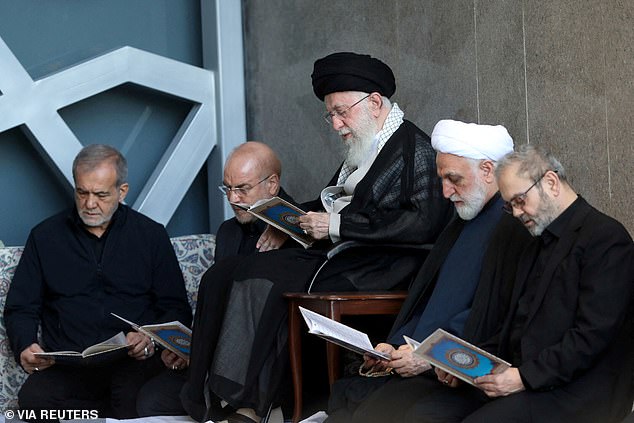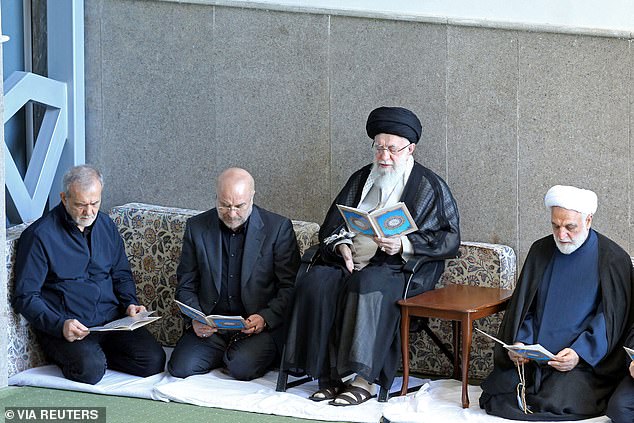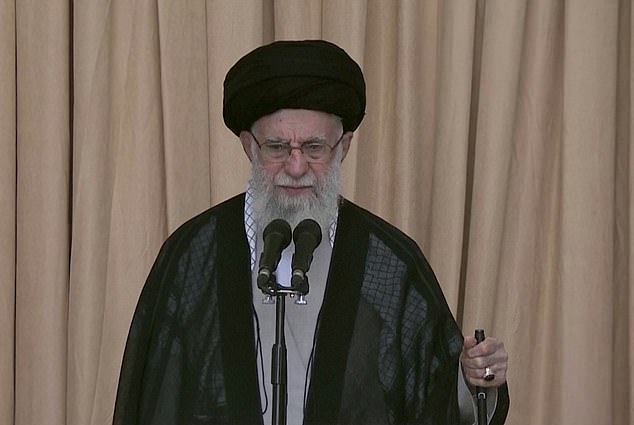Iran’s supreme leader had a rifle at his side as he addressed worshipers in Tehran in a rare public sermon on Friday, days after Iran’s missile attack on Israel.
Ayatollah Ali Khamenei delivered his first sermon in almost five years to thousands of worshipers at the Mosalla mosque in central Tehran.
It comes three days before the first anniversary of the war between Israel and Hamas in Gaza, sparked by the Iran-backed Palestinian group’s attack on October 7.
Among the crowd, some fervent supporters outraged by a year of hostilities held portraits of slain Hamas and Hezbollah allied leaders.
Khamenei, addressing the crowd, used the public address to call Hezbollah’s battle a “vital service to the region,” warning that Israel “won’t last long.”
Iran’s Supreme Leader Ayatollah Ali Khamenei delivers a rare Friday sermon at a mosque in Tehran.

Khamenei attends Hezbollah Hassan Nasrallah commemoration event on Friday
The supreme leader, who exercises the highest authority in Iran, spoke after “a commemoration ceremony” at 10:30 a.m. (7 a.m. GMT) for Hassan Nasrallah, the slain leader of the Tehran-backed Lebanese armed movement Hezbollah.
Khamenei last led Friday prayers in January 2020, after Iran fired missiles at a US army base in Iraq, in response to an attack that killed revered Revolutionary Guard commander Qasem Soleimani.
In Tehran on Thursday, crowds waving Hezbollah and Iranian flags gathered in front of the former US embassy building in Tehran to denounce Israeli “crimes” in the Gaza Strip and Lebanon, Iranian media reported.
Khamenei had declared public mourning in Iran for Nasrallah and on Wednesday said the Hezbollah chief’s death was “no small matter.”
Iran’s Revolutionary Guard, which answers to Khamenei, said Tuesday’s attacks with about 200 missiles were in retaliation for Israel’s killing of Nasrallah along with Guard commander Abbas Nilforoushan in a late September attack in Beirut, and Hamas leader Ismail Haniyeh in Tehran in July.
Hamas, Hezbollah and other armed groups in the Middle East are part of the “axis of resistance” aligned with Iran and opposed to Israel and its ally the United States.
Analysts said Iran’s missile attack, the second to directly target Israel, was aimed at countering a series of setbacks suffered by Tehran and its regional allies.
Iran has said this week’s attack was carried out in “self-defense” and warned of “crushing strikes” against Israel if it retaliates.
The Islamic republic has also warned the United States – Israel’s main weapons supplier – not to intervene, threatening “a harsh response” if it did.
Washington has said Iran must suffer “consequences,” which can be coordinated with Israeli officials, for the ballistic missile launch.
US President Joe Biden said on Thursday he was discussing possible Israeli attacks on Iranian oil sites.
In April, Tehran sent missiles and drones against Israel in retaliation for a deadly Israeli attack on Iran’s consulate in Damascus.
In both attacks, almost all of the missiles were intercepted by Israel or its allies, according to Israeli authorities.

Khamenei attends a commemoration ceremony for Hassan Nasrallah today

